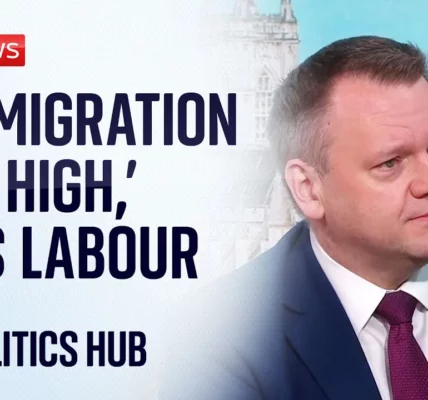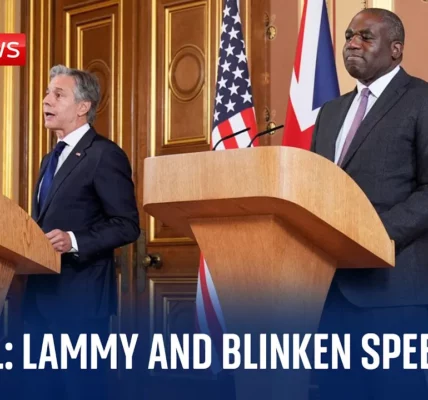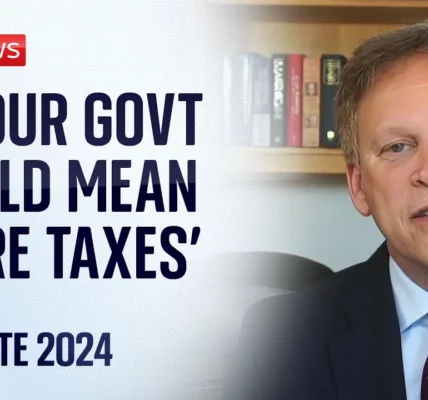Rishi Sunak Launches Conservative Party Manifesto: Key Policies and Analysis

The launch of Rishi Sunak’s Conservative Party Manifesto marks a critical moment in the lead-up to the UK general election. With ambitious tax cuts and significant policy proposals aimed at closing the gap with Labour in the polls, this article delves into the key elements of the manifesto and examines their potential implications for voters and the political landscape.
Introduction
On a pivotal evening in Westminster, Prime Minister Rishi Sunak introduced his Conservative Party Manifesto. This document is seen as a last-ditch effort to revitalize his party’s campaign, which is currently lagging behind Labour in the polls by a significant margin. The manifesto promises £17 billion worth of tax cuts and an additional £1 billion in spending, aiming to resonate with the electorate and secure a second term for the Conservatives. However, with Nigel Farage’s Reform UK party nipping at their heels, Sunak faces mounting pressure to deliver a compelling narrative and concrete results.
Key Policies in the Manifesto
Tax Cuts and Financial Commitments
Central to Sunak’s manifesto are the proposed tax cuts, which include:
- A reduction in National Insurance by 2p by 2027.
- Abolishment of the main rate of National Insurance for self-employed individuals.
- Strengthening of the triple lock on pensions, ensuring pensioners receive fair increases.
These measures aim to alleviate financial burdens on taxpayers, particularly focusing on low and middle-income earners. However, critics argue that these cuts, while popular in theory, may not translate into real relief for struggling families.
Immigration Policy Adjustments
The manifesto also outlines a stringent immigration policy, proposing:
- An annual cap on the number of visas issued.
- Implementation of the controversial Rwanda plan for asylum seekers.
- Commitments to prioritize national security over the rulings of foreign courts.
These proposals reflect a significant shift in the Conservative approach to immigration, appealing to voters concerned about the levels of migration in recent years.
Healthcare and Public Services
Addressing the NHS crisis, the manifesto promises:
- An increase in NHS funding above the inflation rate annually.
- Recruitment of 92,000 nurses and 28,000 doctors over the next five years.
- Reintroduction of a tobacco ban aimed at young people.
These commitments aim to tackle the ongoing staffing shortages and operational challenges faced by the NHS, a critical issue for many voters.
Housing and Infrastructure Development
In terms of housing, Sunak’s manifesto pledges to deliver:
- 1.6 million new homes over the next Parliament, exceeding Labour’s commitments.
- Permanent changes to stamp duty for first-time buyers.
- Reintroduction of the Help to Buy scheme for two years.
These initiatives are designed to address the housing crisis and make homeownership more accessible, particularly for younger voters.
Challenges and Criticism of the Manifesto
Funding and Economic Viability
Despite the ambitious proposals, questions have arisen regarding the feasibility of the funding. The Conservative party claims it can save £45 billion through welfare reforms and tackling tax evasion, but skepticism remains about whether these savings can realistically be achieved. Critics argue that:
- The proposed cuts may lead to further strain on public services.
- There is a lack of clarity on how the promised savings will be realized.
- The overall tax burden is projected to rise, conflicting with the narrative of being a tax-cutting government.
Political Landscape and Voter Sentiment
Polling data suggests that Labour holds a significant lead over the Conservatives, with many voters expressing dissatisfaction with the current government. In key electoral battles, the Reform UK party is emerging as a serious contender, potentially siphoning votes from the Conservatives. Voter sentiments indicate:
- Distrust towards both major parties.
- Concerns about the effectiveness of the proposed policies.
- A desire for authentic leadership and clear communication.
This political landscape poses a significant challenge for Sunak as he seeks to rally support ahead of the election.
Conclusion
Rishi Sunak’s Conservative Party Manifesto presents a mix of bold promises and potential pitfalls. While the proposed tax cuts and policy changes may resonate with certain voter demographics, the overall effectiveness and funding of these initiatives remain in question. As the election draws closer, the Prime Minister must navigate a complex political terrain, addressing voter concerns and articulating a clear narrative to regain lost ground in the polls. The upcoming weeks will be crucial in determining whether these efforts can translate into tangible support from the electorate.
For further insights into UK politics and in-depth analyses of party manifestos, stay tuned and explore our related articles.
“`




